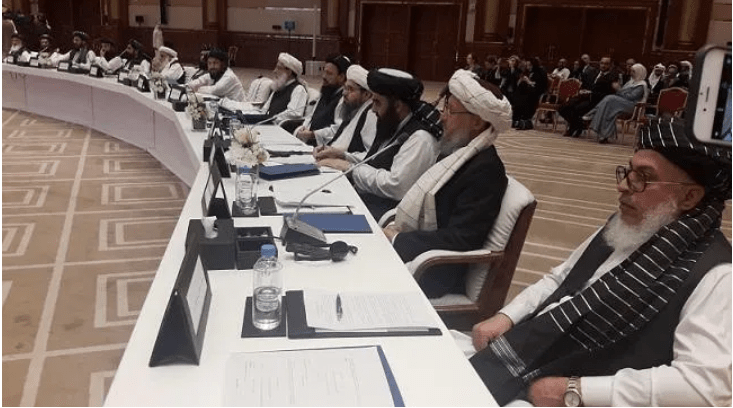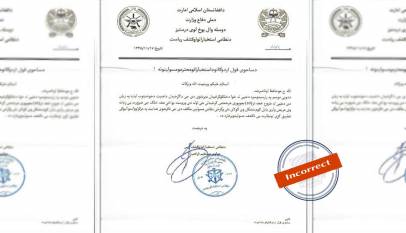Doha talks in stalemate due Taliban’s new demands
KABUL (Pajhwok): The assertions that the Taliban brought to a halt the second round of intra-Afghan talks in Doha by demanding the release of their more prisoners and removal of their leaders from a UN blacklist are said to be mostly true, Pajhwok Afghan News reliably learned on Wednesday.

The Afghan government and Taliban negotiating teams have agreed on procedural rules in Doha after around two and a half month of discussions and the second round of the talks kicked off in Doha on January 9. The talks are underway without any progress.
The negotiating teams have held three meetings in the second round of talks in Doha so far. These meetings did not deeply discuss relevant issues while according to Nader Naderi no meeting between the sides took place since last ten days.
Claim:
The peace talks deadlocked after the Taliban came up with new demands including the release of more prisoners and removal of their leadership names from the UN blacklist.
Some reports say the peace talks entered a stalemate after the Taliban showed no interest in talks because they wanted the release of their 7,000 inmates and removal of some of Taliban leaders names from the UN black list. The Taliban have been engaged with the US on their fresh demands.
Some other sources have published similar reports.
The Taliban’s fresh demands and the stalemate in peace process come after the new US administration announced they will review the US-Taliban peace agreement.
Fact Check:
A well-placed source in Qatar told Pajhwok Afghan News the Taliban were awaiting assurances regarding the release of their more prisoners and removal of their leaders names from the black list and the group may not resume meaningful talks until they get the assurance.
The source did not provide more information, but added the Taliban were unwilling to begin meaningful talks with the Afghan government side over the past two weeks.
A member of the Afghan negotiating team, wishing not to be named, confirmed to Pajhwok the talks had stalemated and said the Taliban were demanding the release of more prisoners and removal of their leaders names from the black list from Americans, not from them.
But GhulamFarooqMajroh, another Afghan negotiator, said the release of prisoners and delisting their leaders were not a condition for peace talks, but the Taliban wanted these demands to be met.
However, Afghan negotiating team member Fawzia Kofi said no such demands had been raised during official meetings between the two sides.
Political Affairs Expert Nazar Mohammad Motmaeen, who is strictly monitoring Doha talks and maintains close relationship with the Taliban, told Pajhwok Afghan News on this issue: “Yes, these two demands have been acknowledged by the US in the agreement signed with the Taliban in February.”
“The Taliban put forward these two demands so that their names are removed from the black list and get assurance about the removal of their leadership names from the black list. Talks may be suspended until these two Taliban demands are met,” he said.
Under the agreement the US is bound to ensure the release 5,000 Taliban prisoners by March, 10, 2020 and ensure the release of more prisoners in three months. According to the agreement, this could be made possible in coordination with all relevant stakeholders under a strategy.
According to the agreement, all prisoners should have been freed until November 2020, but peace talks kicked off around four months back in Doha and so far 5,000 Taliban and 1,000 government prisoners had been freed.
Another part of the US, Taliban agreement reads that after the start of intra-Afghan talks, the US would remove all bans and restrictions on the Taliban until August 2020. An administration process to reverse the restrictions would start soon after the intra-Afghan talks begin, according to the agreement.
The US also pledged in the agreement the removal of Taliban leadership names from the black list by May 2020. Efforts in this regard would start soon after the start of intra-Afghan talks in collaboration with the UNSC members and the Afghan government, says the agreement.
But Taliban leaders names have not yet been removed from the black list and all restrictions and bans on the group remain in place.
NajiaAnwari, spokesperson for the Ministry of Peace Affairs, said the Afghan government was ready for talks on every issue and these issues could be made part of agenda for future talks.
She said: “Taliban prisoners are in Afghanistan’s jails and the authority to free those lies with the Afghan government. Also the Islamic Republic of Afghanistan has the authority to remove Taliban names from the UN black list and we are ready to hold discussion in this regard with the opposite side.”
Pajhwok reached out to the spokespersons of the Afghan government and the Taliban negotiating teams to inquire about the stalemate in peace talks, but they did not comment.
Outcome:
Reliable sources confirmed to Pajhwok that the Taliban had stopped attending intra-Afghan talks meetings due to the delay in release of their remaining prisoners and removal the Taliban leadership names from the black list.
While Afghan government negotiating team members said the Taliban did not discuss these two points with them. The Taliban and the High Council for National Reconciliation did not comment.
Verdict: It is mostly true that the Taliban have demanded the release of their prisoners and removal of their leaders names from the UN black list.
nh/ma
Ahmad Shah Erfanyar
Hits: 16540
Letter regarding ban on roaming during night is fake
KABUL (Pajhwok): The Ministry of Defence (MoD) and an expert have rejected the letter rega…



